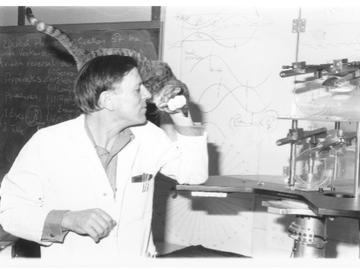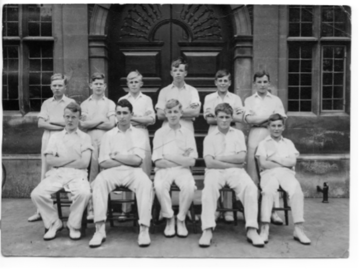Aug. 24, 2022
Geoffrey Melvill-Jones retires at 99

Dr. Geoffrey Melvill-Jones has led an illustrious life dedicated to medicine and research. Retiring only this past year, he has a multitude of tales and accomplishments that are impossible to cover in one article. He has been with the Cumming School of Medicine since 1991, which encompasses over 30 years with the University of Calgary.
While he accomplished many great deeds with UCalgary, he had already contributed significant research during 30 years as a professor of physiology and director of the aerospace medical research unit at McGill University.
Born to parents Dorothy and Professor Sir Bennet Melvill-Jones in Cambridge, United Kingdom, Melvill-Jones chose the sciences early on in his high-school career. He was also an avid athlete, competing successfully in rugby, tennis and swimming. He was completing his senior years of high school as World War 2 was throwing the world into tumult. He remembers an incidence of a Spitfire chasing down a Ju 88 overhead during school lunch, only to discover the next day that the pilot of the Spitfire was an alumnus of his school!
In the fall of 1941, Melvill-Jones entered Emmanuel College of Cambridge University as an undergraduate in the natural sciences program, which included math, physics, chemistry and physiology, followed by a treasured third year of pure advanced physiology conducted under the professorship of Lord E. D. Adrian.
After years of schooling and mentorship he graduated with the Cambridge Natural Sciences degree (MA 1945) followed by a Bachelor of Medicine and Surgery degree (MB, BCh) in 1948.
He spent the next 12 years working in various positions, including 10 years with the Royal Air Force (RAF) Institute of Aviation Medicine at Farnborough, where he served as a research flying personnel medical officer (FPMO) studying physiological problems of spatial disorientation during flight, long-term flying, stress and respiration at high altitude.
In 1953, he married Jenny Marigold (née Burnaby). In 1961, the young couple moved their family from the U.K. to Canada, where Melvill-Jones was offered a new professorship in physiology at McGill University serving as the inaugural director of a new Canadian Aerospace Medical Research facility funded by the Canadian Defense Research Board.
In his 30 years with McGill, some of his research group, led by Dr. Douglas Watt, generated some of the early in-orbit neuroscience experiments. His team was also involved in training both NASA and Canadian astronauts in the theory and practice of the experiments which they performed as both human subjects and as their own technicians when in orbit.
Enter the year 1991. After his wife passed away, and at the invitation of professor Robert Lee, Melvill-Jones moved to Calgary, and joined the Department of Clinical Neurosciences as an adjunct professor. He worked in an active research program in collaboration with a small team focused on integrative action between vestibular, oculomotor and locomotor sensory-motor systems.
One of his first projects was probing the mysteries of sailor’s postural adaption to the ever-tilting deck of a ship at sea, and the mirror of this phenomena on return to land. As the research progressed, Melvill-Jones and his team found their niche.
After first concentrating on the adaptive phenomenon itself they gradually moved toward studying the fundamental mechanisms in the normal control of trajectory curvature. This led to the applied study of integrative action between vestibular, oculomotor and locomotor sensory motor systems concerned with spatial orientation during movement.
In 1971, Melvill-Jones was elected to fellowships in both the Royal Society of London U.K. and the Royal Society of Canada, and in 1991 he received the Royal Society of Canada McLaughlan Medal for Excellence in Medical Science. This award added to a long string of accomplishments and recognitions, including the Quinquennial Gold Medal award of the International Bárány Society for Excellence in Vestibular Research (1988), Fellowship in the Royal Aeronautical Society, London, England (1981), numerous visiting professorships at Stanford and John Hopkins amongst others, and emeritus status at McGill.
Melvill-Jones continues to keep his lively mind engaged through learning new hobbies including classical piano and the violin — both classical and folk fiddling. He is retiring at the esteemed age of 99 years old and will continue to spend much of his time with his four children and nine grandchildren.
The Hotchkiss Brain Institute wishes to thank Dr. Geoffrey Melvill-Jones for his many years of contributions, discoveries and dedication not only to the Institute, but also to the Cumming School of Medicine and University of Calgary. We wish him all the best in his continued endeavours.
Read a full writeup on his life, written by Dr. Melvill-Jones himself.



